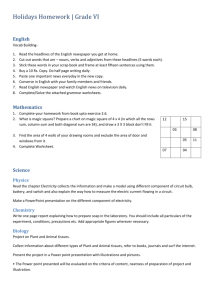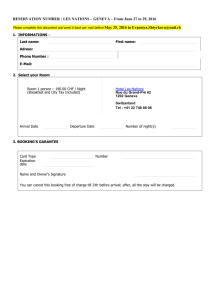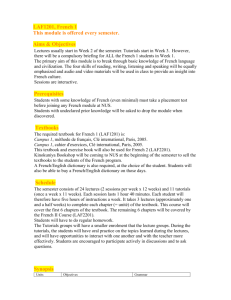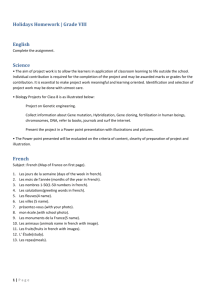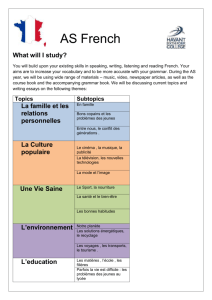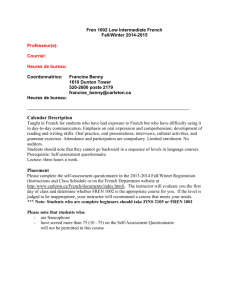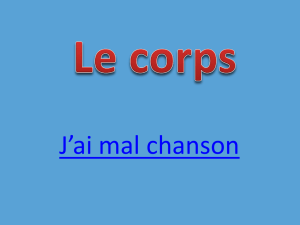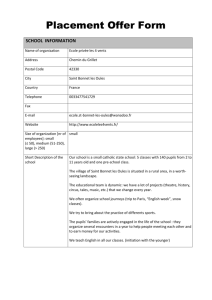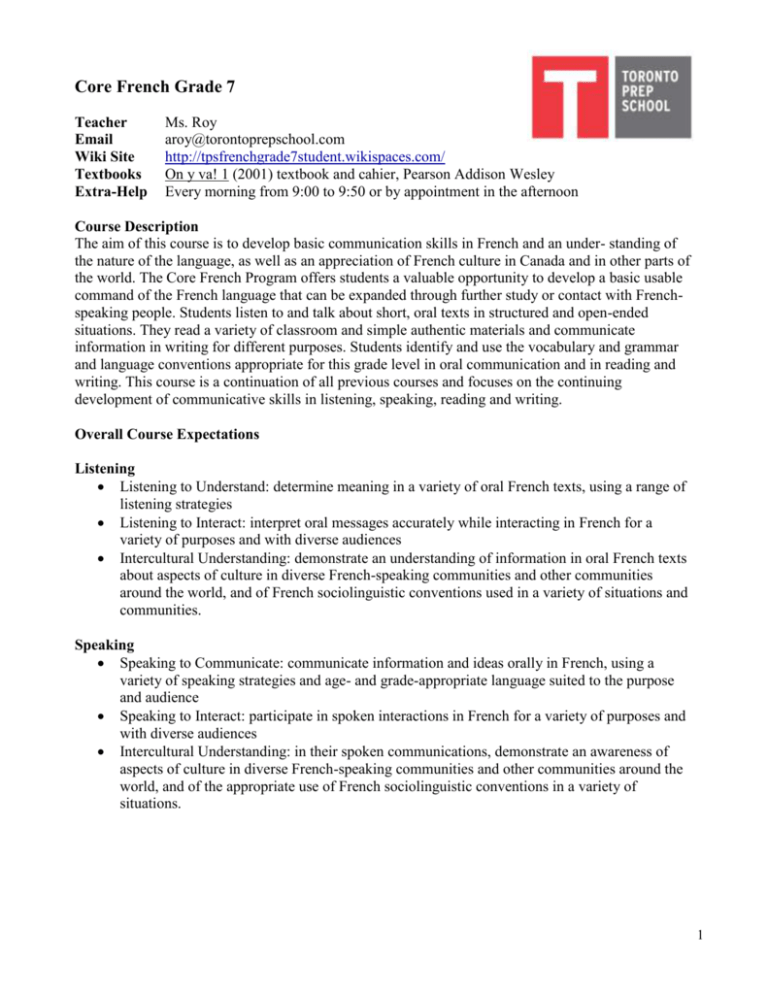
Core French Grade 7
Teacher
Email
Wiki Site
Textbooks
Extra-Help
Ms. Roy
aroy@torontoprepschool.com
http://tpsfrenchgrade7student.wikispaces.com/
On y va! 1 (2001) textbook and cahier, Pearson Addison Wesley
Every morning from 9:00 to 9:50 or by appointment in the afternoon
Course Description
The aim of this course is to develop basic communication skills in French and an under- standing of
the nature of the language, as well as an appreciation of French culture in Canada and in other parts of
the world. The Core French Program offers students a valuable opportunity to develop a basic usable
command of the French language that can be expanded through further study or contact with Frenchspeaking people. Students listen to and talk about short, oral texts in structured and open-ended
situations. They read a variety of classroom and simple authentic materials and communicate
information in writing for different purposes. Students identify and use the vocabulary and grammar
and language conventions appropriate for this grade level in oral communication and in reading and
writing. This course is a continuation of all previous courses and focuses on the continuing
development of communicative skills in listening, speaking, reading and writing.
Overall Course Expectations
Listening
Listening to Understand: determine meaning in a variety of oral French texts, using a range of
listening strategies
Listening to Interact: interpret oral messages accurately while interacting in French for a
variety of purposes and with diverse audiences
Intercultural Understanding: demonstrate an understanding of information in oral French texts
about aspects of culture in diverse French-speaking communities and other communities
around the world, and of French sociolinguistic conventions used in a variety of situations and
communities.
Speaking
Speaking to Communicate: communicate information and ideas orally in French, using a
variety of speaking strategies and age- and grade-appropriate language suited to the purpose
and audience
Speaking to Interact: participate in spoken interactions in French for a variety of purposes and
with diverse audiences
Intercultural Understanding: in their spoken communications, demonstrate an awareness of
aspects of culture in diverse French-speaking communities and other communities around the
world, and of the appropriate use of French sociolinguistic conventions in a variety of
situations.
1
Reading
Reading Comprehension: determine meaning in a variety of French texts, using a range of
reading comprehension strategies
Purpose, Form, and Style: identify the purpose(s) and characteristics of a variety of adapted
and authentic text forms, including fictional, informational, graphic, and media forms
Intercultural Understanding: demonstrate an understanding of information in French texts
about aspects of culture in diverse French-speaking communities and other communities
around the world, and of French sociolinguistic conventions used in a variety of situations and
communities.
Writing
Purpose, Audience, and Form: write French texts for different purposes and audiences, using a
variety of forms and knowledge of language structures and conventions appropriate for this
level
The Writing Process: use the stages of the writing process – including pre-writing, producing
drafts, revising, editing, and publishing – to develop and organize content, clarify ideas and
expression, correct errors, and present their work effectively
Intercultural Understanding: in their written work, demonstrate an awareness of aspects of
culture in diverse French-speaking communities and other communities around the world, and
of the appropriate use of French sociolinguistic conventions in a variety of situations
Units/Topics
Unité
Length
1 – Galaxie virtuelle
2 – Le rythme de la vie
3 – Les bons et les méchants
4 – Destinations d’hiver
5 – Au musée de cire
6 – Un monde pour tout le monde
7 – Une aventure souterraine
8 – Tout est possible…
Total
08 hours
14 hours
16 hours
12 hours
10 hours
18 hours
12 hours
20 hours
110 hours
Topics of Study
Unité 1 – Galaxie virtuelle (8 hours)
2
Language expectations will include the review of:
les adjectifs possessifs; les adverbes; les conjonctions; l’impératif; les verbes réguliers et
les verbes irréguliers au présent (avoir, être, aller, faire)
Unité 2 – Le rythme de la vie (14 hours)
Language expectations will include:
l’impératif
les verbes irréguliers vouloir et pouvoir
Unité 3 – Les bons et les méchants (16 hours)
Language expectations will include:
des adjectifs qualificatifs placés avant le nom
des adjectifs possessifs
Unité 4 – Destinations d’hiver (10 hours)
Language expectations will include:
des adjectifs irréguliers
les adjectifs démonstratifs ce, cet, cette, ces
Unité 5 – Au musée de cire (12 hours)
Language expectations will include the review of:
l’impératif
les verbes vouloir, pouvoir, et devoir
les adjectifs qualificatifs placés avant le nom
les adjectifs possessifs
Unité 6 – Un monde pour tout le monde (18 hours)
Language expectations will include:
les verbes au futur proche
poser des questions avec l’inversion
les prépositions à et de avec un article défini (le, la, l’ ou les)
Unité 7 – Une aventure souterraine (12 hours)
Language expectations will include:
À utiliser les verbes irréguliers partir et sortir
À faire l’accord du verbe quand il y a deux sujets dans une phrase
Unité 8 – Tout est possible… (20 hours)
Language expectations will include the review of:
Les adjectifs démonstratifs
Les adjectifs irréguliers
Les adjectifs qualificatifs avant le nom
Le futur proche
3
Les verbes vouloir, pouvoir, et devoir
Assessment and Evaluation
This course will be broken down into 8 units. Each of these sections will conclude with either a Tâche
Finale summative assignment. There will be a culminating test upon the completion of 2 units. While
the Unit tests and Tâche Finales will make up a large portion of your course mark, there will also be a
number of assignments and quizzes. All count in your evaluation.
This course will also feature a course-culminating task (CCT). The CCT will include a written project
and an oral presentation.
Course Work – 80% (Tests, assignments, quizzes)
CCT – 20% (Final Written project 10%, Final Oral Presentation 10%)
ACADEMIC DUE DATE POLICY
All assignments and projects will have a due date.
The due date is the beginning of the period for that given class. For example if a project is due for the
period one class it must be submitted at 10:00 AM, if it is due for the period four class on a
Wednesday, then it is due at 2:49 PM.
The due date represents the date in which the assignment/project is due. Students should submit the
4
assignment/project to their subject teacher on the due date. If a student does not submit the task on the
due date the subject teacher will contact the parents/guardian to notify them of the outstanding work
that day. The subject teacher will not provide support after the due date has passed.
Late marks will be deducted on late assignments. This strategy is in keeping with the Ministry’s policy
document “Growing Success”. Late projects/assignments will be assessed at a reduction of 5% per day
for the first two days and 10% per day after that to a maximum of 50%. Each project will be assessed
for the 100% of its original value, and late marks will be clearly stated on the final evaluation. After 6
school days, a student will receive a zero. Students are strongly encouraged to still hand in late projects
for assessment and written feedback. A Saturday Club inclusion will be made within the 6 days.
Projects/assignments turned into the teacher after they have been marked and returned to students, will
not be awarded a grade if the project/assignment is one the teacher believes can be copied from peers
(at teacher’s discretion), however, written feedback on the assignment will be given. (For example:
journals, reflection pieces, etc.)
Extension Request Form
There is a procedure for students to seek relief from a due date and extend a deadline without
academic penalty. In extraordinary circumstances, extensions may be granted, if an Extension
Request Form is filled out by the student and signed by a parent and approved by the teacher at least
one day before the due date. It is up to the discretion of the teacher and the school administration
whether or not to accept the Extension Request. A student may request an extension to the maximum
of 2 times in each course and for no more than 3 days. After the allotted time has passed and the
assignment has not been submitted then late marks will be assigned. Our policy recognizes that
extenuating circumstances may legitimately prevent a student from meeting a due date. The Extension
Request Form may be garnered from the principal or vice-principal.
Illness/Doctor’s Notes
If a student is absent on the due date, a doctor’s note (or parental note in case of a family emergency)
must be provided to the subject teacher in order for the student to submit the assignment. The
assignment must be submitted upon the first day the student returns.
Parental Communication
Parents will be contacted if the assignment/project is not submitted on the due date.
Email receipt of Assignments
Since weekend days will be included in the late policy, the submitted time and date will be based on
the time that the assignment arrives in the teacher’s email in-box.
5

